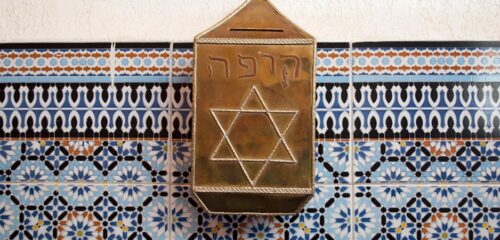

1. protests (n)
a strong complaint expressing disagreement, disapproval, or opposition
2. heritage (n)
features belonging to the culture of a particular society, such as traditions, languages, or buildings, that were created in the past and still have historical importance
3. highlighted (v)
to attract attention to or emphasize something important
4. infused (v)
to cause someone or something to take in and be filled with a quality or a condition of mind
5. combat (v)
to try to stop something unpleasant or harmful fro happening or increasing
6. preservation (n)
the act of keeping something as it is, esp. in order to prevent it from decaying or to protect it from being damaged or destroyed
What US can learn from Morocco
Since early June, an estimated 15 to 26 million people across the United States have participated in protests against the death of George Floyd and the persistence of systematic racism in America. Moreover, a majority of Americans favor working directly with black Americans to solve local issues.
As the US aims to improve race relations, black culture and heritage have become more than just an expression of the black community, but something that is inherently all-American. The BLM ( Black Lives Matter ) movement has highlighted the need for change in the US, and it may be helpful to consider the methods of Moroccan multiculturalism. In Morocco, cultural protection is tied to development, limiting socioeconomic divides and welcoming diversity.
There is a word for the Moroccan ideal of multiculturalism — a term borrowed from the Spanish — known as convivencia (coexistence). Originally a reference to the relative harmony among Christians, Muslims and Jews living in Islamic Iberia (al-Andalus) during the Middle Ages, it now represents the shared history, culture and heritage of Morocco’s diverse national identity and a guide for modern multiculturalism.
While the Moroccan case is not identical to the US, the development and support of a Moroccan multicultural society, through cultural preservation and promotion of minority visibility, can serve as a guide for NGOs and policymakers in America working to combat systemic racism. Such a plan may include funding the preservation of buildings and landscapes infused with black culture and history, supporting small museums or exhibitions on African American activism and achievement, and backing arts programs focused on diversity and inclusion.
Resource: https://www.fairobserver.com/region/middle_east_north_africa/jacqueline-skalski-fouts-moroccan-jews-morocco-jewish-history-moroccan-world-news-media-culture

- What images spring into mind when you hear the word “racism”?
- Have you ever done anything to help stamp out racism?
- Why do you think people are racist?
“At the heart of racism is the religious assertion that God made a creative mistake when He brought some people into being.”
Friedrich Otto Hertz
“Ideologies separate us. Dreams and anguish bring us together.”
Eugene Ionesco

 Advanced
Advanced



